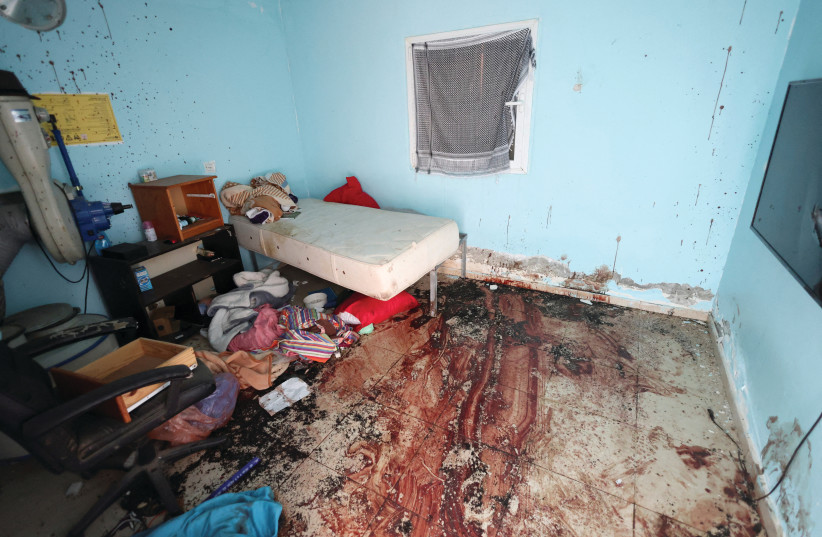In an interview last week with N12, former hostage Dafna Elaykim shared her story of being kidnapped with her younger sister Ella from their home in Kibbutz Nir Oz, being held in various locations across Gaza, and finally being brought home.
"It started in the morning, with so many Red Alerts," Dafna began. "After half an hour or an hour, they entered our kibbutz, and my dad entered my room with Dikla and Tomer [his partner and her son]."
"He took the three of us: myself, Ella, and Tomer, and told us to enter the shelter and hide under the bed. And stay quiet."
"They entered the house and started shooting, shooting at the door, and they hit my dad in his leg."
"They dragged us out from under the bed and started filming a [Facebook] Live."

During the Facebook Live, the Hamas terrorists filmed the family asking Noam, Dafna's father, to tell people who had been captured, where, and in what condition they were.
In the video, the whole family can be seen, with blood coming from Noam's leg, Dafna crying, Dikla comforting Ella, and Tomer sitting nervously at the end, his mother doing the best she can to comfort him.
The terrorists take Tomer and force him to try and coax out any remaining residents who might have been hiding in houses nearby.
"Did you understand where they were taking him?" the interviewer asked.
"They told us that they needed him to open the doors of surrounding houses and bring them out. They told us that he would be fine so long as he didn't try anything and did as he was told."
"After they took us to our car and started driving. And then, actually, some different terrorists shot at our car because they thought it was Israelis trying to flee."
"Some of the shots hit Dikla, and she died there on the spot."
They then transferred Ella and Dafna to a different car and left Noam and Dikla in the old car.
"Were you able to say anything to him [Noam]?" the interviewer asked.
"No."
"I think about the three of them all the time. If I had sat where Dikla was, if they had asked me to get people from the houses, if there was some way I could have prevented their deaths."
She was forced to leave her dad as he bled to death and her dad's partner right after her murder without even a goodbye.
In Gaza
Both Dafna and Ella were brought into Gaza and taken to a civilian's home, where they were looked after by paramedics.
Their captors spoke to them in Hebrew, bringing doctors who spoke Hebrew to stitch them up and figure out their ages.
They were told, "Do everything we say, or we will kill you."
"That's how I knew they might kill us for any little thing."
The two sisters were kept with a family, Ella was permitted to play with the children, and at first, they were told to eat separately, but eventually, Ella was allowed to eat with the family.
"We ate more in the beginning, but later it was reduced as the war continued."
"Ella didn't really understand what was happening, so she was doing ok."
"But when she saw a rifle in the house, Ella began to get afraid and started to become stressed that they would kill us and began to cry."
Their captors attempted to calm Ella down, telling her that the rifle was to protect them from civilians who might attack them as they were being transferred to another house.
"We heard explosions all around us. Eventually, the ceiling began to shake, and white dust fell from it."
Once the IDF figured out where they were, they were moved on to a third house in the middle of the night.
"They woke us in the middle of the night and told us to put the hijab on."
"At some point, we were sleeping in school, and we were there in a hijab at all times."
"The school was full of civilians who had lost homes or been made to move."
"I was afraid to sleep. I wasn't sure if they would just kill me in my sleep or if the building would just fall on me as I slept. I wasn't sure if I went to sleep if I or Ella would wake up."
"I didn't think anyone in Israel cared. We thought they'd prefer if we stayed in Gaza and came back as corpses."
Two weeks before release, they were transferred to another facility where they were placed with several other female hostages and kept there until release.
Dafna tells the interviewer how she can't stop thinking about the girls she left there, how they are kept, and how they are beaten.
When they were brought back, Dafna didn't believe she had been brought back to Israel and that at any moment, Hamas would jump out and attack them.
"How good it is to get back to normality," their mother, Maayan Zin, said.
Above Dafna's bed is a drawing of her from a video released by Hamas.
"Why is this here, above your bed?" the interviewer asked.
"It's a reminder that everything can end and that you can't know what will happen tomorrow."
